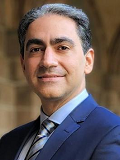Addressing the Impact of Urban Overheating Using Advanced Heat Mitigation Technologies
Time
3:00 PM, May 19, 2025 (Beijing)5:00 PM, May 19, 2025 (Sydney)
Contact Us
Email: jbdejournal@sciexplor.comSpeaker

Prof. Mat Santamouris
Distinguished Professor, High Performance Architecture, Arts Design and Architecture, UNSW Sydney, Australia.
Distinguished Professor of High-Performance Architecture at the University of New South Wales (UNSW), Australia.
Former Professor at the University of Athens, Greece.
Visiting Professor at multiple international institutions, including:
• Cyprus Institute
• Metropolitan University London
• Tokyo Polytechnic University
• Free University of Bozen-Bolzano
• Brunel University London
• Seoul National University
• National University of Singapore
• Universiti Teknologi MARA (UiTM), Malaysia
Former President of the National Center for Renewable Energy Sources and Energy Savings (CRES), Greece.
Distinguished Professor of High-Performance Architecture at the University of New South Wales (UNSW), Australia.
Former Professor at the University of Athens, Greece.
Visiting Professor at multiple international institutions, including:
• Cyprus Institute
• Metropolitan University London
• Tokyo Polytechnic University
• Free University of Bozen-Bolzano
• Brunel University London
• Seoul National University
• National University of Singapore
• Universiti Teknologi MARA (UiTM), Malaysia
Former President of the National Center for Renewable Energy Sources and Energy Savings (CRES), Greece.
Named a Top-Cited Researcher in Building and Construction (2019–2022) according to the Stanford University global citation rankings.
Recognised as a Highly Cited Researcher by Clarivate Analytics for four consecutive years.
Host

Prof. Behza Rismanchi
Department of Infrastructure Engineering, Faculty of Engineering and Information Technology, The University of Melbourne, Parkville, VIC, Australia.
Associate Professor Behzad Rismanchi is an expert in sustainable building design, energy efficiency, and decarbonisation strategies. Based at the University of Melbourne, he leads research in building services engineering, occupant thermal comfort, and renewable energy integration. With over two decades of experience in academia and industry, he has secured competitive research funding and led impactful collaborations with government and industry.
As a Chartered Professional Engineer (CPEng), he actively contributes to policy and regulatory frameworks and serves as Deputy Network Convenor of the Decarbonising Building Industry (DBI) network. He is also a dedicated educator, teaching core energy subjects and mentoring PhD candidates and early-career researchers. As the school's International Engagement Representative, he fosters global partnerships to advance sustainable building innovation and knowledge exchange.
Introduction
Mitigating the urban heat island (UHI) effect has become a major priority for the scientific community. In recent years, several techniques have been developed and applied with considerable success. These include: the use of cool materials with high solar reflectance and thermal emissivity; the development of smart materials with advanced optical and thermal properties; the incorporation of green spaces through thoughtful landscaping and design; the application of heat sinks such as soil, air, or water to dissipate excess heat; the implementation of effective shading and solar control strategies; and the adoption of cool and green roofs on urban buildings.
This presentation aims to review current advancements in understanding and mitigating the UHI effect and local climatic changes in urban areas. It also presents the characteristics and performance of innovative mitigation technologies designed to address these challenges.
Presentation
Presentation
387



